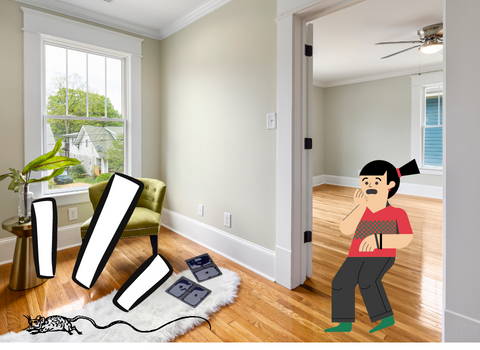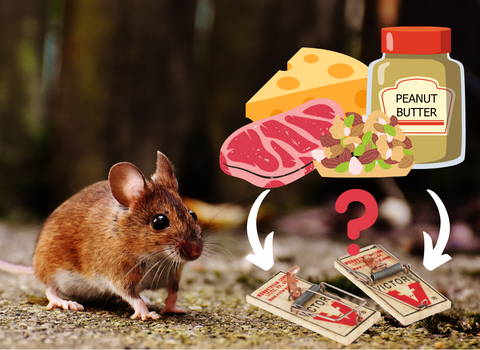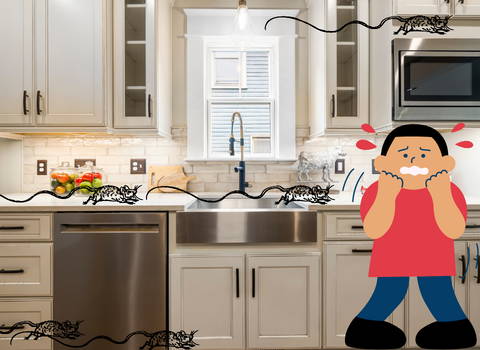How to Catch a Mouse When Traps Don't Work
Most people will not admit that mouse infestation is among the most common problems of homeowners. There are many ways to catch a mouse and get rid of them completely. One of the many ways to achieve mouse control is by setting up mouse traps. But what if they do not work? How can you catch mice?

DIY Methods When Your Mouse Traps are No Longer Working
Planning to catch mice is difficult, but you must keep in mind that the mouse problem will only get worse without using mouse traps. However, what if your store-bought mouse traps do not work? Well, there are other methods that you can try in catching mice.
Peanut butter is widely known to be the best mouse trap bait as it has already been proven to be the most effective. You can also use chocolate or hazelnut spread as these are also effective baits, but they may not work like peanut butter.
So, to get started with the DIY methods, the following are some that you can try:
Bucket and Cardboard Ramp Method
This one is touted as a DIY mouse trap that works well. One of the advantages of using this mouse trap is that it is a humane trap and does not kill mice. They might get distressed once they get inside the trap, but they will stay alive.
To do this method, you need a paper tube that will act as the tunnel. A piece of cardboard may work, but mice tend to choose tunnels. Thus, increasing the chance of trapping these pests.
Next is to put at least a pea size amount of peanut butter inside the tunnel and then place the paper roll on the edge of a bucket.
Using cardboard, create a ramp that the mouse can use to reach the bait.
The trick in this method is that the mouse will reach the bait and fall into the bucket once it loses its balance. An important tip in this method is that the bucket should be tall enough to prevent the mouse from climbing out.
Live traps like these are easy to assemble as long you have the materials needed. This will also teach you basic principles in properly setting mouse traps.
Spoon and Bucket Method
This is almost the same as the first method mentioned. However, this one uses a spoon with peanut butter as bait to attract mice from their hiding places. Just place a bucket on the floor under the spoon. This way, the mice will trigger the trap and instantly fall into the bucket once they try to reach the bait.
Pets
Among the best ways to get rid of your pest problem with mice is to have pets. Have a dog or cat, and they will help eliminate mice, rats, and other rodents.
Mouse Cubes
These traps are humane options you can try to catch mice and protect your house from these rodents. Such devices are effective in catching mice while keeping them alive.
A Few Reasons Your Mouse Trap is Not Working
There are common mistakes that you may be doing, which is why your mouse traps are not working. These mouse trap mistakes may include not choosing the right place, using the wrong kind of bait, or putting in too much bait. You should keep in mind that traps should lure these rodents out of their hiding place.
Not Using the Right Bait
Among the effective baits used in mouse traps is peanut butter. Any by-products of nuts can be used as bait since these are what these rodents feed on in the wild. It makes the traps more effective to attract mice and catch them.
Mice also love any food with a strong scent. Any food that has a salty or sweet smell will most likely lure them out of their hiding places in your house. Cheese is also a common bait, but it is much better to get types of cheese with a strong smell.
Other baits you can use to catch these rodents are jerky and bacon. When you think that you are using the wrong bait and you do not see any signs that the rodents are eating the bait, you can use materials often used in building their nests. Nesting materials that can attract more mice are dental floss, string, or cotton.

Putting Too Much Bait
Baiting is important to catch a mouse when using traps. However, using too much can also make it ineffective. This will only result in rodents getting little mouse trap bait that prevents triggering the trap. Thus, resulting in these pests not getting caught.
This only gives the rodents more food sources and only causes the rodent problem to worsen. Putting just a small amount will be enough to force any rodent to take a step on the trap.
Using Bare Hands to Handle Baits
The sense of smell of mice is sensitive, which means that they can easily detect human smell on the bait when you handle it with your bare hands. You are contaminating the bait with your smell, which prevents that trap from working as expected. You need to use gloves when you set mouse traps inside your house. The types of gloves used for health care, preparing food, and washing dishes will work great.
You should also wear gloves when handling used traps especially when a rodent is caught. Thick gloves are recommended if you are using snap traps just in case you get accidentally snapped when picking up traps.
Not Regularly Changing the Baits
Rotten food or bait that is a few weeks old may affect the effectiveness of the traps. Prevent this by constantly changing the baits every 4-6 weeks.
Choosing the Wrong Trap
One of the many reasons why you cannot catch a mouse using traps is not using the right one. You might be using glue traps and wonder why no rodents are ever caught. Keep in mind that there are traps that are more effective than other mouse traps depending on the severity of your pest problem.
To know which one is right for you, it is recommended that you a variety of traps first. This way, you can easily decide if you have to avoid traps that you were using before or stick to better ones.
Placing Traps in Open Spaces
You should not place traps in open spaces. Mice tend to find shelter in dark areas. You will most likely hear them scurrying near the walls. This means you have to set the traps facing the walls.
Set more traps that are at least 2 to 3 feet apart to increase the chances of catching more mice. You will notice a big difference in the effectiveness of the traps and improve your pest control efforts.
Underestimating Mice Activity
Never underestimate mice activity. At first, they might avoid the traps. One thing you can do first is place unset mouse traps with bait. This way, they will feed on it without feeling threatened. Once you notice that they are eating bait it is then that you start setting them to catch the mice.


